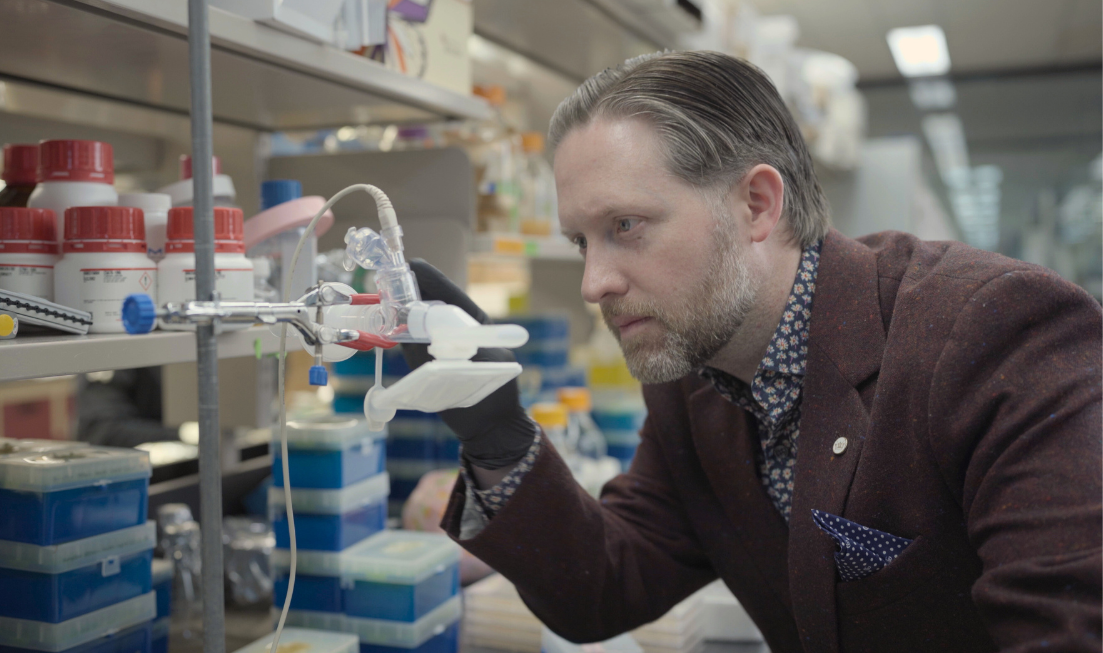Promising results from Phase 1 human trials of McMaster’s inhaled COVID-19 vaccine

Matthew Miller co-leads the McMaster research team that developed the inhaled COVID-19 vaccine, now in Phase 2 human trials. The new vaccine is delivered directly to the lungs as an inhaled mist.
BY Blake Dillon
July 4, 2025
McMaster University’s inhaled COVID-19 vaccine safely generates immune responses associated with protection in the lungs, recent clinical trial data show.
The Phase-1 study, which ran from 2022 to 2024 at McMaster, measured the safety and immunogenicity of the new vaccine in a cohort of 36 healthy adults. The results were published this week in the journal Nature Communications.
The clinical trial was led by Michael G. DeGroote Institute for Infectious Disease Research scientists Fiona Smaill, Zhou Xing, Brian Lichty, and Matthew Miller.
McMaster staff scientists Mathy Jeyanathan and Sam Afkhami, and postdoctoral fellow Michael D’Agostino, were co-first authors of the paper.
The phase-1 human trials showed promising early results for the new vaccine, which is delivered directly to the lungs as an inhaled mist, instead of intramuscularly by needle.
The inhaled vaccine provided study participants with three layers of mucosal defence in the respiratory tract — an area where there is typically very little protection against the virus, even after mRNA vaccination or COVID-19 infection.
“Even though they have significantly reduced incidence of death and hospitalization, the current COVID-19 vaccines have generally not provided protection against breakthrough infections,” says Smaill, professor emerita in the Department of Pathology & Molecular Medicine.
“Our studies suggest that this is in part due to their inability to provide strong mucosal immunity in the lower respiratory tract — something our inhaled vaccine does quite well.
“This trial has made a strong case for inhaled vaccines to become a key tool in the prevention of future outbreaks and pandemics.”
The new publication serves as independent, peer-reviewed validation of the research team’s discoveries, which have already led to the approval of Phase-2 trials, now underway.
“The data generated from these clinical trials position us well to proceed with the next stages of clinical development,” says Xing, a professor in McMaster’s Department of Medicine and a scientist at the McMaster Immunology Research Centre.
“Besides its safety, we have also demonstrated inhaled aerosol delivery of our vaccine to be a powerful way to fill the gap in respiratory mucosal immunity in human lungs.”
The trial also helped the research team determine optimal vaccine dosage, which, along with safety and effectiveness, will continue to be evaluated during the ongoing Phase 2 human trials.
McMaster’s inhaled vaccine platform, which was established decades ago for tuberculosis, is now the flagship translational research initiative at the university’s Global Nexus, a health innovation accelerator designed to address the challenges of translating and commercializing health-relevant discoveries.
The success of the inhaled vaccine program demonstrates how collaboration between discipines and sectors, as well as sustained investment in research infrastructure, catalyzes important new health solutions, says Miller, executive director of Global Nexus.
“These inhaled aerosol vaccines not only illustrate a longstanding area of strength for McMaster, but also underscore what the university is truly capable of when we have the right infrastructure and expertise in place,” says Miller, who is also scientific director of the Institute for Infectious Disease Research.
“From concept and study design to biomanufacturing and clinical trials, every aspect of this study has been conducted on campus.”
“Global Nexus is leveraging the template set by our vaccine team to similarly advance new drugs and diagnostics to the point of clinical trials and beyond,” Miller says.
These trials are powered by the university’s growing life sciences ecosystem, which includes Global Nexus and the Canadian Pandemic Preparedness Hub, notes Lichty, director of McMaster’s Robert E. Fitzhenry Vector Laboratory.
McMaster’s biomanufacturing capacity is a key reason that the research team was able to move into human trials so efficiently, Lichty says.
“Having GMP [good manufacturing practices] biomanufacturing capacity at McMaster unquestionably accelerated our pathway to human trials,” says Lichty.
“And with the recent funding from both the federal and Ontario governments to build a new, enhanced biomanufacturing facility at McMaster, our ability to support future clinical trials of all sorts will dramatically expand in the near future.”
McMaster’s inhaled vaccine technology has been licensed to AeroImmune Inc., a university spinout company supported by the McMaster Seed Fund.
Phase-2 human trials are now underway. For more information, including how to participate, visit aerovax.ca.


